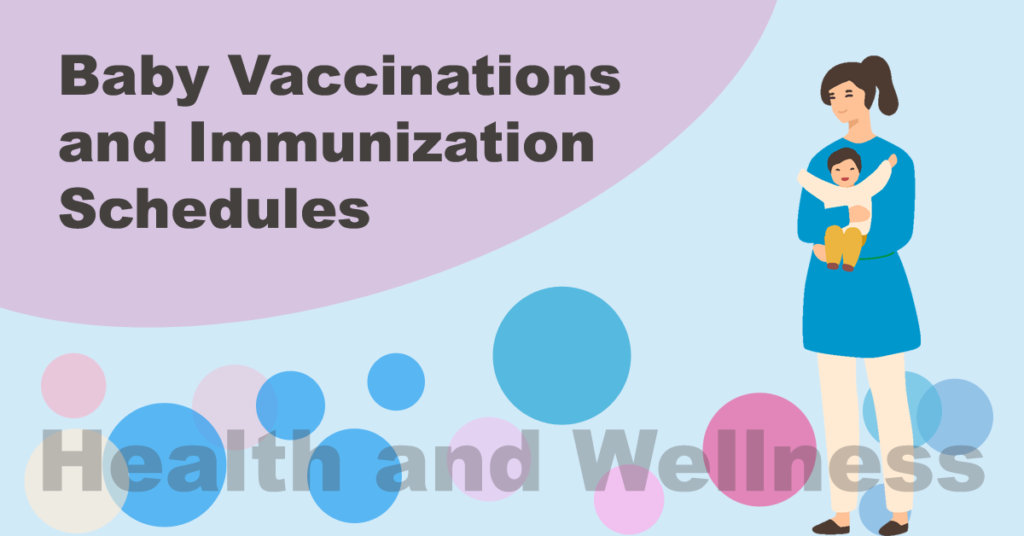Baby Vaccinations and Immunization Schedules
Baby Vaccinations and Immunization Schedules: As a parent, nothing is more important than your child’s health and well-being. An important aspect of ensuring their long-term health is following the recommended child vaccination and immunization schedule. Vaccines play an important role in protecting your young child from potentially life-threatening diseases and infections. In this article, we will discuss the importance of immunizing children and provide an overview of recommended immunization schedules.
The importance of immunizing children
Vaccination is one of the most effective ways to prevent disease and protect your child’s health. They work by stimulating your baby’s immune system to produce antibodies, which provide immunity against certain diseases. By vaccinating your child, you not only protect them but also help prevent the spread of disease in your community.
Childhood immunizations have been shown to be safe and effective, and have significantly reduced the incidence of many serious diseases. Diseases such as measles, mumps, rubella, polio, and whooping cough, once common, are now rare in countries with high vaccination rates.
Recommended immunization schedules
The Centers for Disease Control and Prevention (CDC) and the World Health Organization (WHO) provide guidelines for immunization schedules. These schedules outline the recommended vaccines and the ages at which they should be administered.
It is important to note that the immunization schedule may vary slightly depending on your country or region. It’s best to consult with your pediatrician or healthcare provider to make sure you’re following the right schedule for your baby.
Birth to 2 Months
During the first two months of your baby’s life, they will receive several important vaccinations. These include:
- Hepatitis B
- Diphtheria, tetanus, and pertussis (DTaP)
- Haemophilus influenzae type b (Hib)
- Inactivated poliovirus (IPV)
- Pneumococcal conjugate (PCV13)
- Rotavirus
4 to 6 Months
Between the ages of four and six months, your baby will receive additional doses of the vaccines mentioned above, along with:
- DTaP
- Hib
- IPV
- PCV13
- Rotavirus
6 to 18 Months
From six to eighteen months, your baby will continue to receive doses of the vaccines mentioned earlier, along with:
- Hepatitis B
- DTaP
- Hib
- IPV
- PCV13
- Measles, mumps, rubella (MMR)
- Varicella (chickenpox)
18 to 24 Months
Between eighteen and twenty-four months, your baby will receive additional doses of the vaccines mentioned above, along with:
- Hepatitis A
- DTaP
- IPV
- MMR
- Varicella
Common concerns and misconceptions
It is not uncommon for parents to have concerns or misunderstandings about children’s immunizations. Let’s focus on some of the most common:
Vaccines cause autism.
This is a widely debunked myth that began with a flawed and retroactive study. Numerous scientific studies have since confirmed that there is no link between vaccines and autism.
Too many vaccines overwhelm the immune system.
Our immune system is exposed to countless germs and antigens every day. Vaccines contain only a small fraction of what our immune system naturally encounters. They do not suppress the immune system but strengthen and train it so that it can respond effectively to specific diseases.
Natural immunity is better than vaccination.
Although natural immunity can occur after recovery from infection, it often comes at a significant cost. Vaccination provides a safer and more controlled way of inducing immunity without the risks associated with the diseases themselves.
Conclusion
Following the recommended childhood vaccination and immunization schedule is an essential part of protecting your little one’s health. By vaccinating your child, you are not only protecting them, but also contributing to the overall health and well-being of your community. Remember to check with your pediatrician or healthcare provider to make sure you’re following the right schedule for your baby. Together we can keep our children safe and healthy.
Also Read about:



Pingback: Baby Teething Symptoms and Remedies: A Guide for New Parents - Medicinefiles
Pingback: Babies Bedtime Routine - Medicinefiles